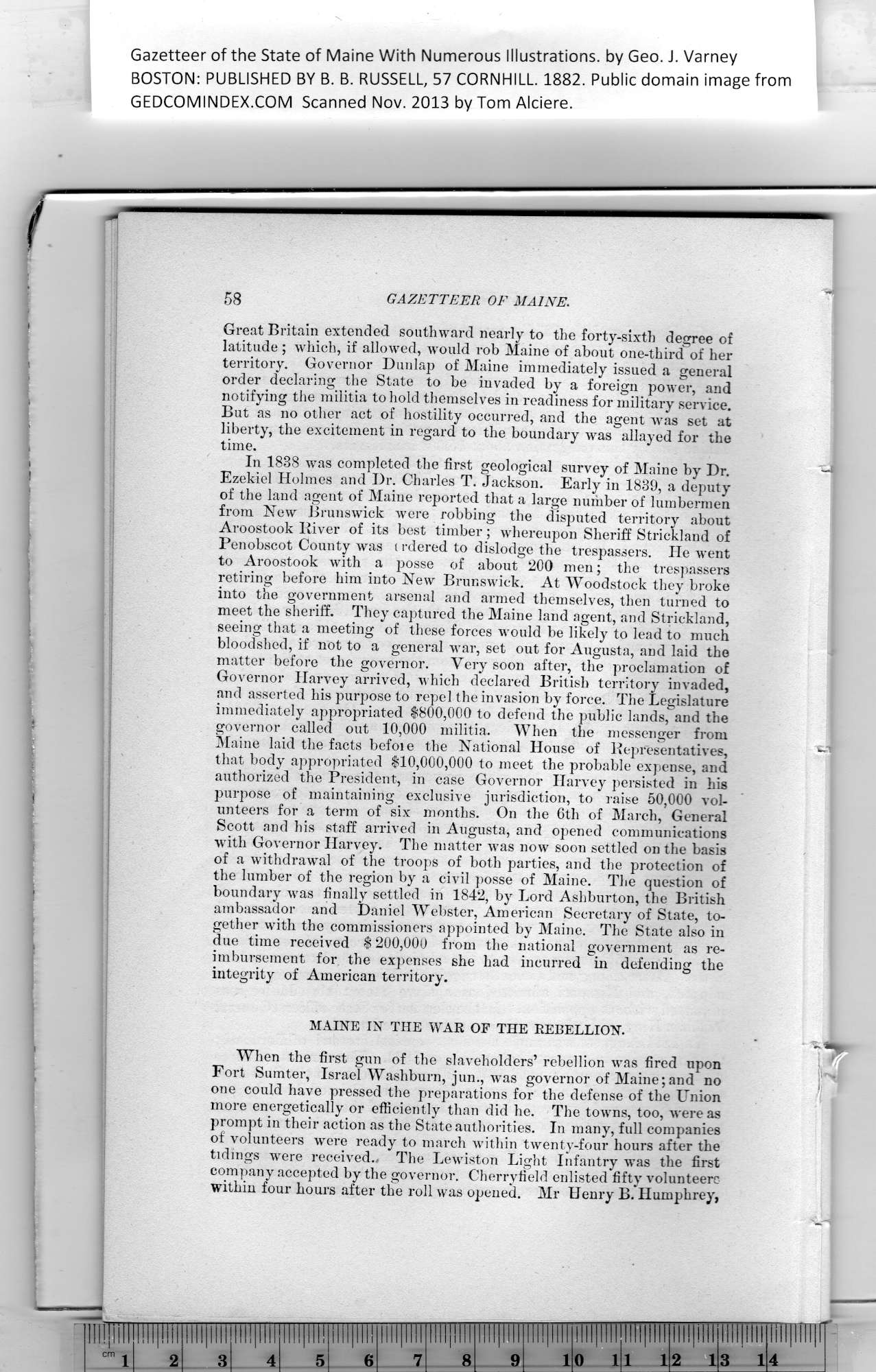|
Gazetteer of the State of Maine With Numerous Illustrations, by Geo. J. Varney
BOSTON: PUBLISHED BY B. B. RUSSELL, 57 CORNHILL. 1882. Public domain image from
58 GAZETTEER OF MAINE.
Great Britain extended southward nearly to the forty-sixth decree of
latitude; which, if allowed, would rob Maine of about one-third°of her
territory. Governor Dunlap of Maine immediately issued a general
order declaring the State to be invaded by a foreign power, and
notifying the militia to hold themselves in readiness for military service.
But as no other act of hostility occurred, and the agent was set at
liberty, the excitement in regard to the boundary was allayed for the
time.
In 1838 was completed the first geological survey of Maine by Dr.
Ezekiel Holmes and Dr. Charles T. Jackson. Early in 1839, a deputy
of the land agent of Maine reported that a large number of lumbermen
from New Brunswick were robbing the disputed territory about
Aroostook River of its best timber; whereupon Sheriff Strickland of
Penobscot County was (rdered to dislodge the trespassers. He went
to Aroostook with a posse of about 200 men; the trespassers
retiring before him into New Brunswick. At Woodstock they broke
into the government arsenal and armed themselves, then turned to
meet the sheriff. They captured the Maine land agent, and Strickland,
seeing that a meeting of these forces would be likely to lead to much
bloodshed, if not to a general war, set out for Augusta, and laid the
matter before the governor. Very soon after, the proclamation of
Governor Harvey arrived, which declared British territory invaded,
and asserted his purpose to repel the invasion by force. The Legislature
immediately appropriated $800,000 to defend the public lands,^and the
governor called out 10,000 militia. When the messenger from
Maine laid the facts befoie the National House of Representatives,
that body appropriated $10,000,000 to meet the probable expense, and
authorized the President, in case Governor Harvey persisted in his
purpose of maintaining exclusive jurisdiction, to raise 50,000 vol-
unteers for a term of six months. On the 6th of March, General
Scott and his staff arrived in Augusta, and opened communications
■with Governor Harvey. The matter was now soon settled on the basis
of a withdrawal of the troops of both parties, and tbe protection of
the lumber of the region by a civil posse of Maine. Tbe question of
boundary was finally settled in 1842, by Lord Ashburton, the British
ambassador and Daniel Webster, American Secretary of State, to-
gether with the commissioners appointed by Maine. The State also in
due time received $ 200,000 from the national government as re-
imbursement for the expenses she had incurred in defending the
integrity of American territory.
MAINE IN THE WAR OF THE REBELLION.
When the first gun of the slaveholders’ rebellion was fired upon
Fort Sumter, Israel Washburn, jun., wras governor of Maine;and no
one could have pressed the preparations for the defense of the Union
more energetically or efficiently than did he. The towns, too, were as
prompt in their action as the State authorities. In many, full companies
of volunteers were ready to march within twenty-four hours after the
tidings were received. The Lewiston Light Infantry was the first
company accepted by the governor. Cherryfield enlisted fifty volunteers:
within four hours after the roll was opened. Mr Henry B. Humphrey,
PREVIOUS PAGE ... NEXT PAGE
This page was written in HTML using a program written in Python 3.2
|
